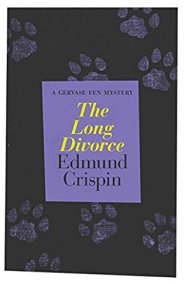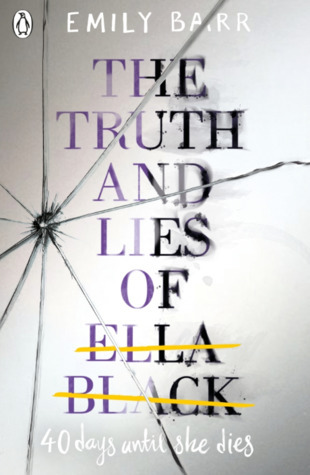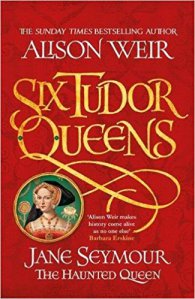
Never let it be said that I’m a stubborn man. Well, okay, no, not that so much, but only a short while ago I was owning up to the shame that I’d probably never read this book and yet here I am — following reassurances from no less authorities than Nick Fuller and TomCat — reviewing, and so presumably having read, it. Here’s the heart-in-my-hands moment: Crispin wrote 4½ great books, then a terrible one, then this one, then another terrible one, and this was the only one I’d not read. But it’s bracketed by two books so awful that I’d wipe them out of existence, so my fears were, I feel, well-founded. And you want to know what I thought, right? Were my reservations borne out? Who was right? Ohmygod the tension…well, let’s get into it.
Honestly, it’s…fine. You can sort of understand why Crispin quit fictional writing for two decades following this, as it’s rather thin on plot and attempts to superintend this by putting a lot of detail into character mindset, action, or setting, but thankfully we’re nowhere near the barren wasteland of preceding novel Frequent Hearses, a.k.a. Sudden Vengeance (1950). Essentially a “poison pen plot” in your typical Stage 4 Idyllic English Village, we add in a questionable suicide and an undeniable murder with an impossible angle, and watch the various character types — windy Hotelier, blustery Chief Constable, stoic Reserved Policeman, ambitious Constable, aggressive Mill Owner, flighty Young Girl, two competing GPs — all sort of wander around each other having conversations that explore their feelings but add little to the plot before a conclusion is spelled out to them all by the mysterious outsider.
It reads like Crispin was more interested in the people than the plotting, a sense in no way diminished by a final chapter that takes some pains to resolve the personal issues among them all and establish the status quo. And I don’t mind this per se, there’s no harm in taking an interest in your characters, but the sense I come away with is that he wrote a sort of Anthony Trollope-esque village story and then put in five paragraphs about death and anonymous letters here and there so it can be sold as crime fiction. Indeed, it almost feels more interesting from the perspective of how the “old ways” of classic detection are going out of vogue — forensic tests on hairs found in letters, or lines like “very few people realise that you can tell a man’s blood group from his saliva” certainly had no place in Carr and Christie’s (and Crispin’s) best works. And the following would be frank sacrilege:
“Scotland Yard isn’t called in nearly as often as detective novelists seem to think,” Casby replied with a trace of heat. “They’re not all that good, you know — if you look at the improvements in criminal science during the last twenty years, you’ll find that nearly all of them originated not in the Metropolitan C.I.D. but in the provincial ones, places like Coventry.”
What would John Rhode say to that, eh?
The flip-side of this is that you have to swallow some pretty chunky soup when it comes to the deductions that round things out, because it does come down to detection rather than science to resolve it. A key point used to, er, point directly at the eventual killer is the precise sort of thing that, twenty years previously, would have been argued just as lucidly to point away from them, and I find myself somewhat chary at the use of it this way round. Equally, an overwhelming — like, astonishingly so — coincidence is used from an entirely unrelated matter to resolve two disparate issues that really don’t belong in the same chain of reasoning.
But, well, while I could easily have coped without having read this, there’s still a wonderfully gregarious charm to Crispin’s writing both in moments of lightness:
It was one of Mrs Flack’s most notable characteristics that her laughter had in some fashion got itself detached from her sense of humour … it had developed a regular, mechanical tone as though Mrs. Flack were reading laughter — ha! ha! ha! — aloud from a book.
…and the sober reflections that became more marked in Crispin’s writing as his career wore on (“…a clean hole, a hole matter-of-fact rather than repellent, but wide enough and deep enough to let death in”). I’d certainly rather have this instead of Frequent Hearses as my abiding memory of Crispin and Fen, but I’d take Swan Song (1947) over both of them. He feels rather a spent force here, perhaps keen to improve on his previous showing and then put his whimsy and playfulness away to concentrate on other matters. And, I have to say, a good choice was made all round.
Also, the cat is barely in it, so why the last two Kindle editions of this felt the need to imply its presence so heavily on the cover is beyond me…





For the Follow the Clues Mystery Challenge, this links to last week’s The Lucky Policeman because both involve the discovery of a dead body in the woods.
Share this:
- Share on Facebook (Opens in new window)
- Click to share on Google+ (Opens in new window)
- Click to share on Tumblr (Opens in new window)
- Click to share on Pinterest (Opens in new window)
- Click to share on Reddit (Opens in new window)
Like this:Like Loading...
 Never let it be said that I’m a stubborn man. Well, okay, no, not that so much, but only a short while ago I was owning up to the shame that I’d probably never read this book and yet here I am — following reassurances from no less authorities than Nick Fuller and TomCat — reviewing, and so presumably having read, it. Here’s the heart-in-my-hands moment: Crispin wrote 4½ great books, then a terrible one, then this one, then another terrible one, and this was the only one I’d not read. But it’s bracketed by two books so awful that I’d wipe them out of existence, so my fears were, I feel, well-founded. And you want to know what I thought, right? Were my reservations borne out? Who was right? Ohmygod the tension…well, let’s get into it.
Honestly, it’s…fine. You can sort of understand why Crispin quit fictional writing for two decades following this, as it’s rather thin on plot and attempts to superintend this by putting a lot of detail into character mindset, action, or setting, but thankfully we’re nowhere near the barren wasteland of preceding novel Frequent Hearses, a.k.a. Sudden Vengeance (1950). Essentially a “poison pen plot” in your typical Stage 4 Idyllic English Village, we add in a questionable suicide and an undeniable murder with an impossible angle, and watch the various character types — windy Hotelier, blustery Chief Constable, stoic Reserved Policeman, ambitious Constable, aggressive Mill Owner, flighty Young Girl, two competing GPs — all sort of wander around each other having conversations that explore their feelings but add little to the plot before a conclusion is spelled out to them all by the mysterious outsider.
It reads like Crispin was more interested in the people than the plotting, a sense in no way diminished by a final chapter that takes some pains to resolve the personal issues among them all and establish the status quo. And I don’t mind this per se, there’s no harm in taking an interest in your characters, but the sense I come away with is that he wrote a sort of Anthony Trollope-esque village story and then put in five paragraphs about death and anonymous letters here and there so it can be sold as crime fiction. Indeed, it almost feels more interesting from the perspective of how the “old ways” of classic detection are going out of vogue — forensic tests on hairs found in letters, or lines like “very few people realise that you can tell a man’s blood group from his saliva” certainly had no place in Carr and Christie’s (and Crispin’s) best works. And the following would be frank sacrilege:
Never let it be said that I’m a stubborn man. Well, okay, no, not that so much, but only a short while ago I was owning up to the shame that I’d probably never read this book and yet here I am — following reassurances from no less authorities than Nick Fuller and TomCat — reviewing, and so presumably having read, it. Here’s the heart-in-my-hands moment: Crispin wrote 4½ great books, then a terrible one, then this one, then another terrible one, and this was the only one I’d not read. But it’s bracketed by two books so awful that I’d wipe them out of existence, so my fears were, I feel, well-founded. And you want to know what I thought, right? Were my reservations borne out? Who was right? Ohmygod the tension…well, let’s get into it.
Honestly, it’s…fine. You can sort of understand why Crispin quit fictional writing for two decades following this, as it’s rather thin on plot and attempts to superintend this by putting a lot of detail into character mindset, action, or setting, but thankfully we’re nowhere near the barren wasteland of preceding novel Frequent Hearses, a.k.a. Sudden Vengeance (1950). Essentially a “poison pen plot” in your typical Stage 4 Idyllic English Village, we add in a questionable suicide and an undeniable murder with an impossible angle, and watch the various character types — windy Hotelier, blustery Chief Constable, stoic Reserved Policeman, ambitious Constable, aggressive Mill Owner, flighty Young Girl, two competing GPs — all sort of wander around each other having conversations that explore their feelings but add little to the plot before a conclusion is spelled out to them all by the mysterious outsider.
It reads like Crispin was more interested in the people than the plotting, a sense in no way diminished by a final chapter that takes some pains to resolve the personal issues among them all and establish the status quo. And I don’t mind this per se, there’s no harm in taking an interest in your characters, but the sense I come away with is that he wrote a sort of Anthony Trollope-esque village story and then put in five paragraphs about death and anonymous letters here and there so it can be sold as crime fiction. Indeed, it almost feels more interesting from the perspective of how the “old ways” of classic detection are going out of vogue — forensic tests on hairs found in letters, or lines like “very few people realise that you can tell a man’s blood group from his saliva” certainly had no place in Carr and Christie’s (and Crispin’s) best works. And the following would be frank sacrilege:











